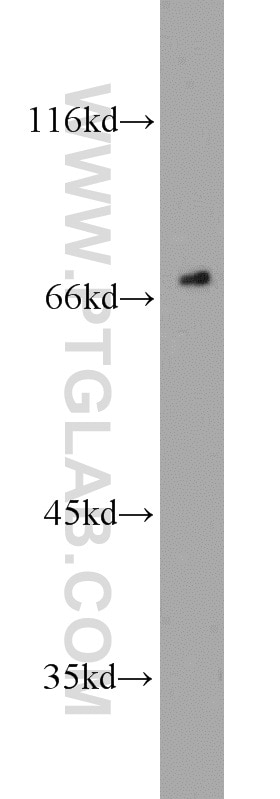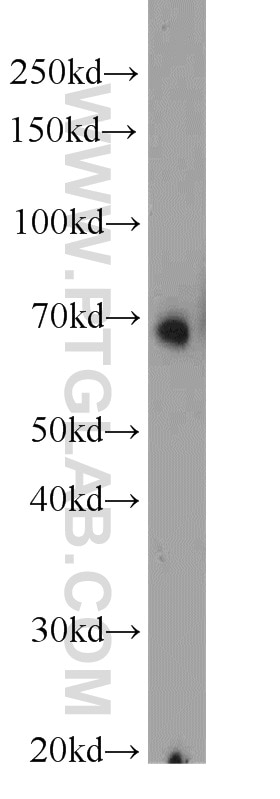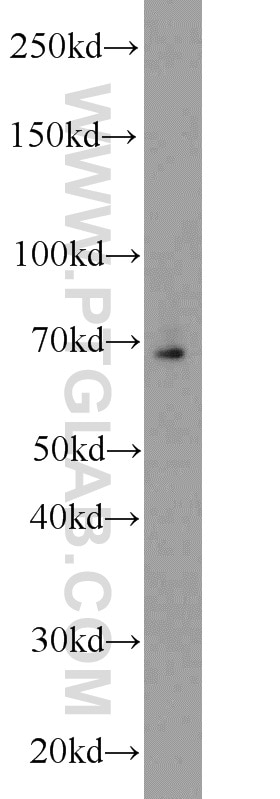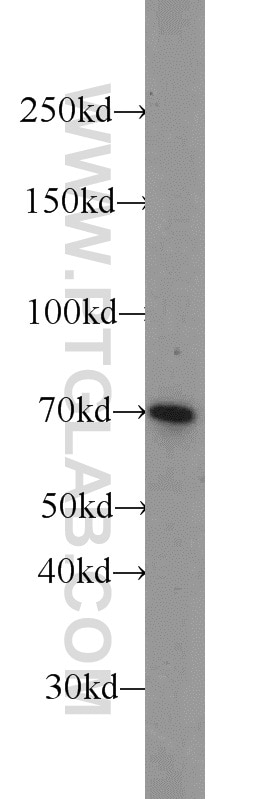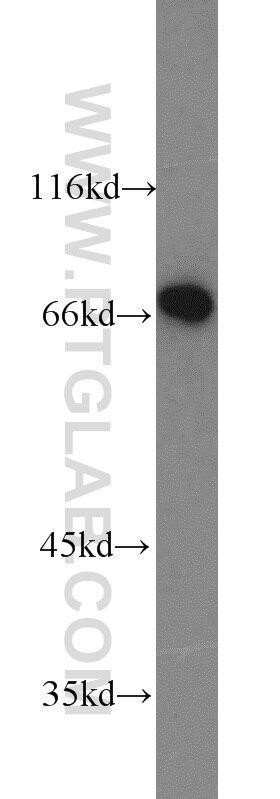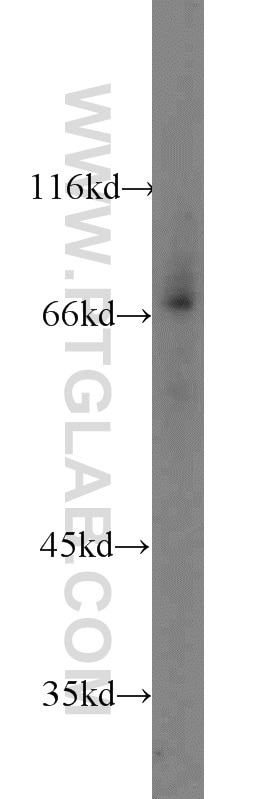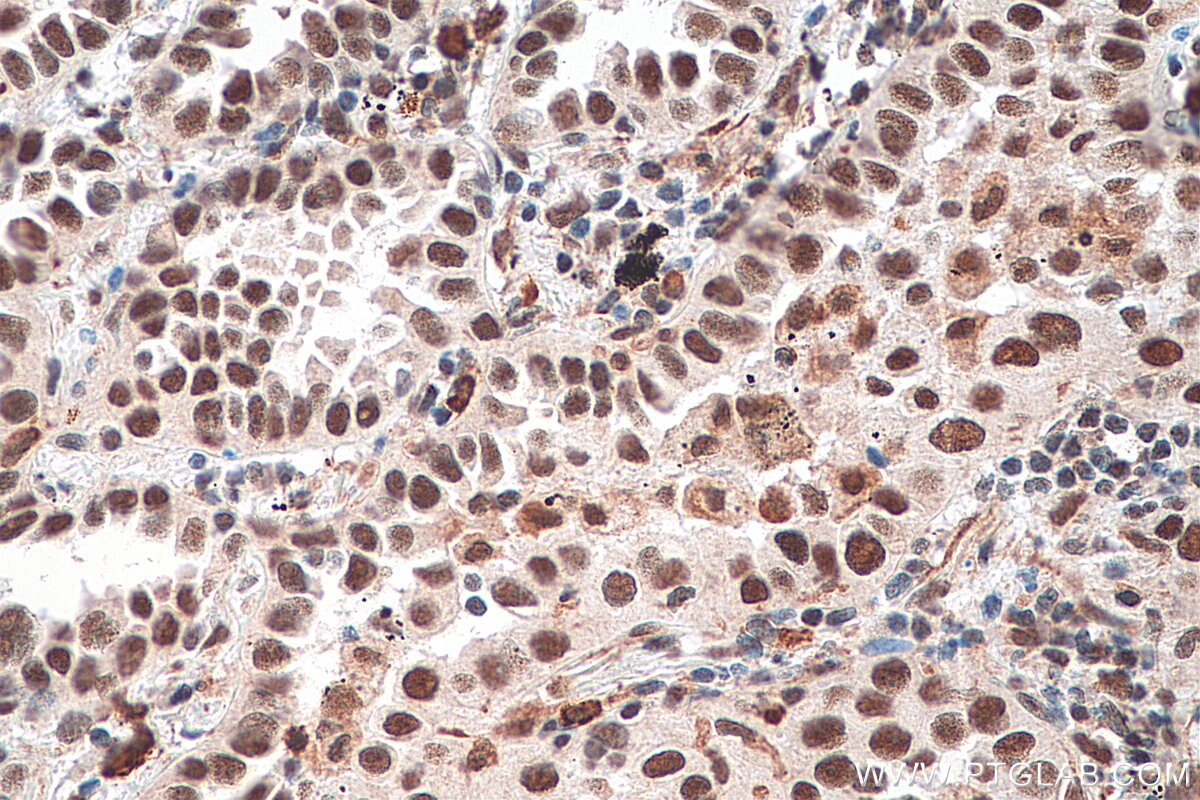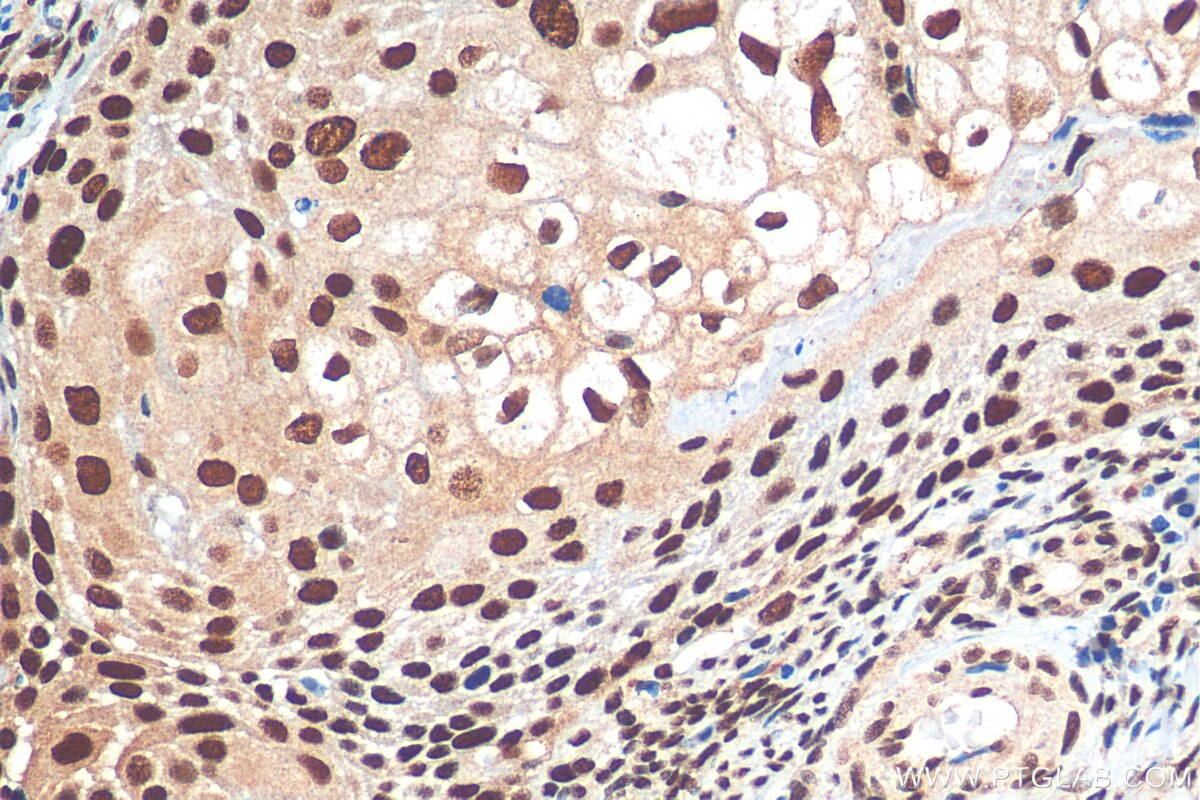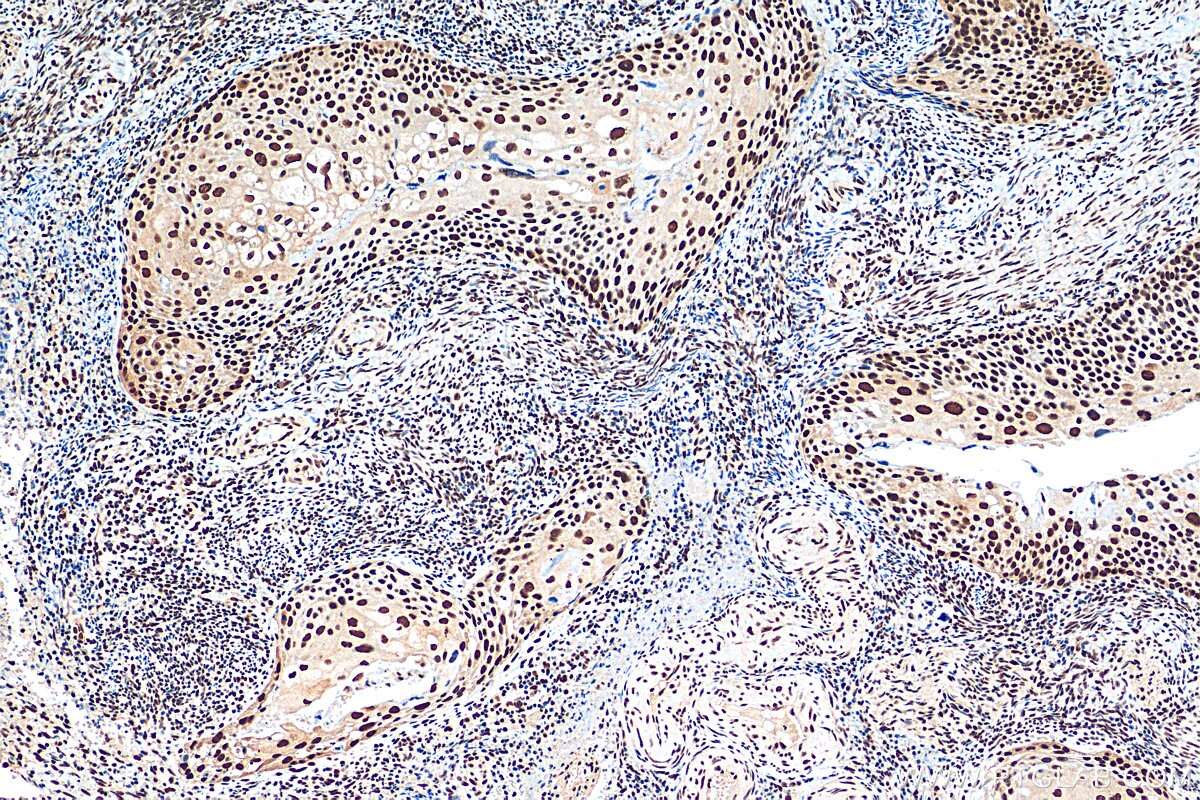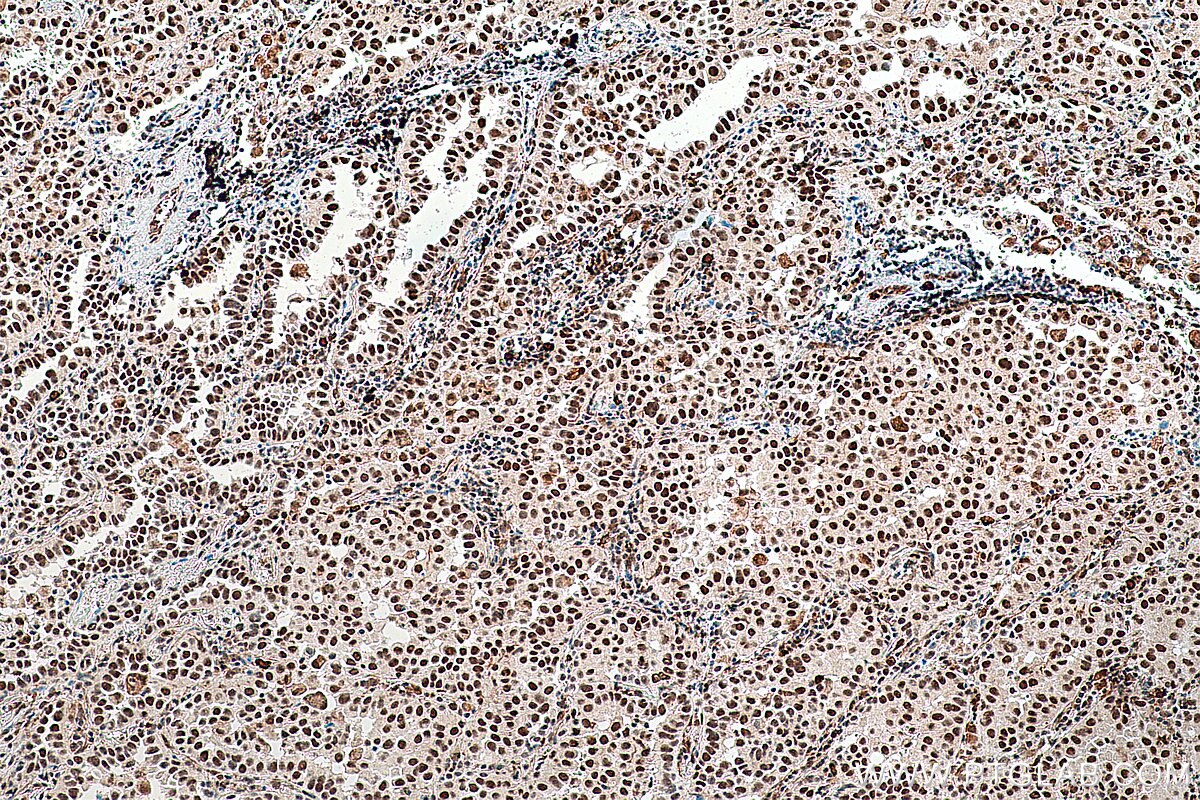Validation Data Gallery
Tested Applications
| Positive WB detected in | K-562 cells, mouse spleen tissue, mouse testis tissue, HepG2 cells, MCF-7 cells, mouse kidney tissue |
| Positive IHC detected in | human cervical cancer tissue, human lung cancer tissue Note: suggested antigen retrieval with TE buffer pH 9.0; (*) Alternatively, antigen retrieval may be performed with citrate buffer pH 6.0 |
Recommended dilution
| Application | Dilution |
|---|---|
| Western Blot (WB) | WB : 1:500-1:1000 |
| Immunohistochemistry (IHC) | IHC : 1:200-1:800 |
| It is recommended that this reagent should be titrated in each testing system to obtain optimal results. | |
| Sample-dependent, Check data in validation data gallery. | |
Published Applications
| WB | See 14 publications below |
| IHC | See 2 publications below |
| IF | See 1 publications below |
Product Information
16107-1-AP targets HSF1 in WB, IHC, IF, ELISA applications and shows reactivity with human, mouse samples.
| Tested Reactivity | human, mouse |
| Cited Reactivity | human, mouse, rat |
| Host / Isotype | Rabbit / IgG |
| Class | Polyclonal |
| Type | Antibody |
| Immunogen |
CatNo: Ag9023 Product name: Recombinant human HSF1 protein Source: e coli.-derived, PGEX-4T Tag: GST Domain: 184-529 aa of BC014638 Sequence: KVVNKLIQFLISLVQSNRILGVKRKIPLMLNDSGSAHSMPKYSRQFSLEHVHGSGPYSAPSPAYSSSSLYAPDAVASSGPIISDITELAPASPMASPGGSIDERPLSSSPLVRVKEEPPSPPQSPRVEEASPGRPSSVDTLLSPTALIDSILRESEPAPASVTALTDARGHTDTEGRPPSPPPTSTPEKCLSVACLDKNELSDHLDAMDSNLDNLQTMLSSHGFSVDTSALLDLFSPSVTVPDMSLPDLDSSLASIQELLSPQEPPRPPEAENSSPDSGKQLVHYTAQPLFLLDPGSVDTGSNDLPVLFELGEGSYFSEGDGFAEDPTISLLTGSEPPKAKDPTVS 相同性解析による交差性が予測される生物種 |
| Full Name | heat shock transcription factor 1 |
| Calculated molecular weight | 529 aa, 57 kDa |
| Observed molecular weight | 68-80 kDa |
| GenBank accession number | BC014638 |
| Gene Symbol | HSF1 |
| Gene ID (NCBI) | 3297 |
| RRID | AB_11182610 |
| Conjugate | Unconjugated |
| Form | |
| Form | Liquid |
| Purification Method | Antigen affinity purification |
| UNIPROT ID | Q00613 |
| Storage Buffer | PBS with 0.02% sodium azide and 50% glycerol{{ptg:BufferTemp}}7.3 |
| Storage Conditions | Store at -20°C. Stable for one year after shipment. Aliquoting is unnecessary for -20oC storage. |
Background Information
HSF1 belongs to heat-shock transcription factors that activate heat-shock response genes under conditions of heat or other stresses. Also, HSF1 has been linked with oogenesis, spermatogenesis, and placental development. It can activate AKT and inactivate JNK and CASP3 to protect cardiomyocytes from death. And it has a role in the regulation of life span and establishes a role for SIRT1 in protein homeostasis and heat-shock response. The calculated molecular weight of HSF1 is 57 kDa, but HSF1 migrates at approximately 80 kDa which likely represents different phosphorylation states (PMID: 18434628).
Protocols
| Product Specific Protocols | |
|---|---|
| IHC protocol for HSF1 antibody 16107-1-AP | Download protocol |
| WB protocol for HSF1 antibody 16107-1-AP | Download protocol |
| Standard Protocols | |
|---|---|
| Click here to view our Standard Protocols |
Publications
| Species | Application | Title |
|---|---|---|
Acta Neuropathol Commun RBM45 associates with nuclear stress bodies and forms nuclear inclusions during chronic cellular stress and in neurodegenerative diseases. | ||
Am J Physiol Cell Physiol Cancer associated fibroblasts suppressed ferroptosis in glioblastoma via upregulating lncRNA DLEU1 | ||
Ann Thorac Surg Upregulation of Nuclear Heat Shock Factor 1 Contributes to Tumor Angiogenesis and Poor Survival in Patients With Non-Small Cell Lung Cancer. | ||
Front Microbiol The Capsid Protein VP1 of Coxsackievirus B Induces Cell Cycle Arrest by Up-Regulating Heat Shock Protein 70. | ||
Pharm Biol Aspirin relieves the calcification of aortic smooth muscle cells by enhancing the heat shock response. | ||
Toxicol In Vitro Ginsenoside Rg3 induces FUT4-mediated apoptosis in H. pylori CagA-treated gastric cancer cells by regulating SP1 and HSF1 expressions. |

